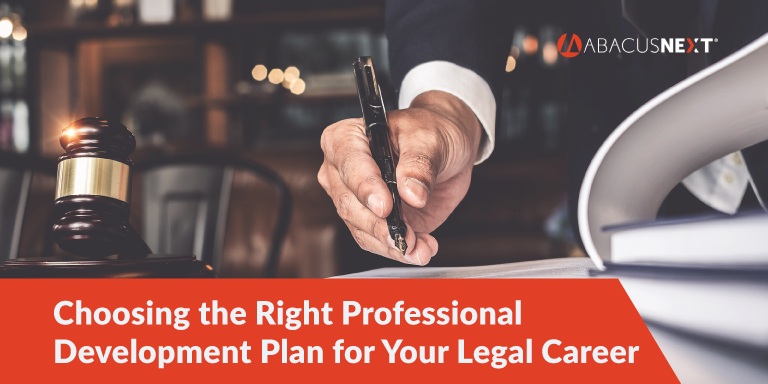Choosing the Right Professional Development Plan for Your Legal Career

How Does an Attorney Make Partner or Become a Judge? We Asked a Professional Development Expert to Find Out
What does it take to advance in your law career? We decided to ask one of our Abacus Private Cloud clients, Joe Hughey. Joe works as the Marketing Director at Florida-based firm ShankmanLeone and has been in the legal industry for 16 years. Along with his marketing responsibilities, Joe specializes in the professional development of the firm’s attorneys. He let us pick his brain about this topic and gave us valuable insight into how attorneys can make partner or join the bench.
Joe points out, before anything, L1-L3 attorneys need to learn the law and develop their writing skills. He says young attorneys can join associations like the Young Lawyers Division, but he believes their jobs should come before anything else. After they’ve moved up a few levels, they can aspire to become partners or judges. To start the journey of making partner, attorneys should choose which type of firm they want to work for, decide on an equity or a nonequity track, and figure out the requirements they’ll need to meet. At ShankmanLeone, for example, there are both objective and subjective requirements. The objective requirements – which are consistent across the industry for making partner – pertain to how many hours the attorney’s billing, how much revenue he or she is bringing in, and how many new clients the attorney’s introducing to the firm.
Subjective requirements, on the other hand, are harder to quantify and record. According to Joe, “Subjective requirements tell you if the attorney is worthy of being a partner and if he or she is dedicated to the firm.” Marketing falls under the subjective requirements at ShankmanLeone. Every month, each attorney works with Joe for at least an hour to lay out his or her strategic marketing plan. Together, they make sure it’s in line with the overall firm marketing plan and the goals. Then, Joe allows the attorneys to execute the plan and follows up with them regularly.
Another subjective requirement at ShankmanLeone is community service. Joe sets up time for the attorneys to volunteer at the Ronald McDonald House Charity, which helps the firm identify its most dedicated members. Those who fit the firm’s culture have a better chance of making partner. Joe notes the most successful partners he worked with in the past had to meet very strong subjective requirements.
Becoming a judge calls for an entirely different playbook. There are two options in Florida: apply through the Judicial Nominating Committee (JNC) or campaign for an open position. Applying through the JNC is the most traditional way, however, lawyers can’t apply unless they’ve been practicing law for a minimum of seven to eight years. From there, the JNC submits applications to the government and the governor appoints his choice to the bench. If his attorneys want to apply through the JNC, Joe works with them on 10-year plans, which detail important deadlines and milestones. Joe’s tips for applying through the JNC include strategically networking with JNC members, developing relationships with them, and going to JNC meetings. Key to doing this successfully is attending the right events. Joe’s last suggestion is for lawyers to publish articles and blogs, which can introduce them to the right people.
In professional development, Joe coaches ShankmanLeone’s attorneys and gives them feedback on areas for improvement. He also offers suggestions, helps them develop game plans, and follows up with them frequently. He says, “You have to recognize the individual needs of each attorney and work with them on a peer-to-peer basis. Half the time you play confidant, and half the time you direct them…”
Joe believes one of the most important ways firms can support attorneys’ professional development is by giving them the opportunity to build their networks away from the office. It’s important for firms to offer attorneys reprieve from the day-to-day pressure and chances to learn something new about their practice areas. When firms help their attorneys create quality contacts, their referral networks are stronger for it.
The last question we asked Joe was if there are any universal characteristics attorneys need if they want to further their careers. His answer may surprise you: “The ones who are really successful know how to pace themselves. They take time off when it’s appropriate, and they’re diligent about scheduling. They also make time for things outside of the firm.” This is particularly important for millennials who are fresh out of law school and are finding the balance between work and their lives outside of work. “If they don’t pace themselves,” Joe says, “they burn out.”